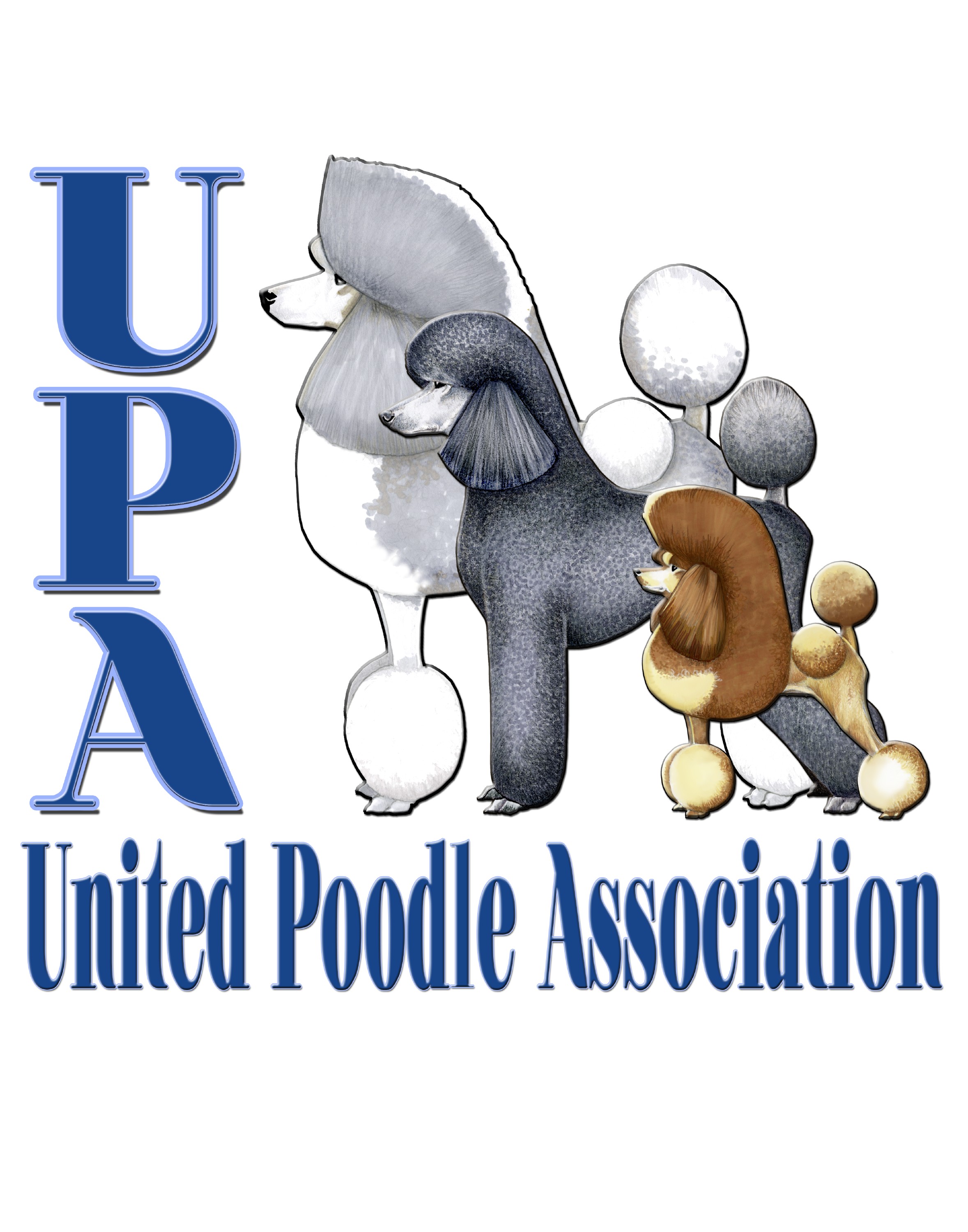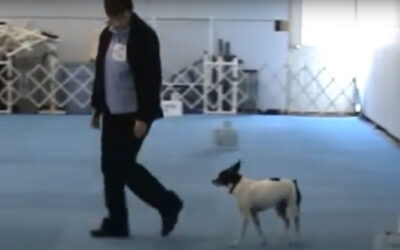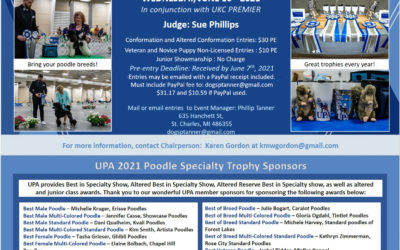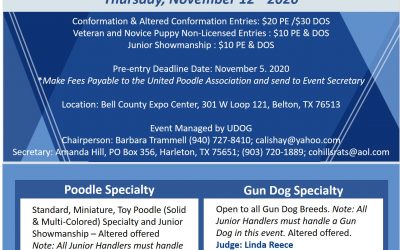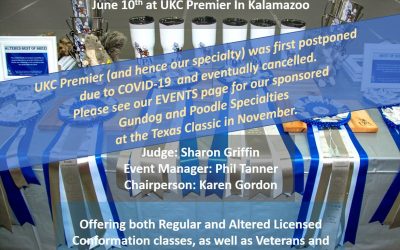Poodle Colors, Patterns and Disqualifiers
Author: Wendy Coffey (UPA Education Committee Member)Peer Reviewer: Barbara Hoopes, Ph.D. The poodle has been at the top of the popularity charts for decades due to their intelligence; versatility in effortlessly going from stunning show dog to performance dog,...
Addison’s Disease
– by Kelsey Dixon
Addison’s disease (hypoadrenocorticism) is an autoimmune disease in which the body attacks the adrenal glands. “This leads to a deficiency in key hormones such as cortisol and aldosterone, which regulate responses to stress and water/electrolyte balance.” (1) The cause of Addison’s is unknown, even though many past and ongoing studies exist.
There is no genetic screening test for this disease today; no way to know if a dog inherited it prior to becoming symptomatic. However, there is a clear genetic link, and a 2003 study found a “heritability of 0.75, which means that 75% of the factors that influence whether or not a dog develops hypoadrenocorticism are genetic.” (2) Unfortunately, “the genes responsible have not been identified.” (2) A 2008 Study suggests that in poodles a recessive gene may not be in play, and “the condition is likely polygenetic—due to multiple genes.” (2)
Service Animals
– by Rebekah Undersander
Service animals teams are protected via the Americans with Disability Act (ADA). The ADA defines service animals as a dog or miniature horse that is individually trained to do work or perform tasks for people with disabilities. Animals whose sole function is to provide comfort or emotional support do not qualify as service animals under the ADA. The only species protected by ADA are dogs and miniature horses, but states can choose to allow additional species.
To qualify as a service animal dogs must….
1. have at least one task that assists the handler with their disability
2. be under control
3. must be potty trained
Save those points!
by Marguerite Plank, UKC Senior Rally Judge
Sometimes you’ll hear the Rally judge say at a briefing, “You enter the ring with a perfect score. It’s up to you to keep as many points as you can.”
Primarily, you should have read the rules several times … after all, when you sign the entry form, you affirm that you did indeed read and understand the rules. When I enter rally trials, whether AKC, UKC, or WCRL, I have my rulebook with me at the trials. It’s a good idea to review the signs at your level so you know how they should be performed. Some of them are a little tricky. The time to ask the judge questions is during the walk-through. I’m always happy to help you understand how I expect a sign to be performed and keep most of your points.
Here are a few places where I see people giving back the points they came in with:
Bloat
-by Michele Harvey
Gastric Dilatation Volvulus (GDV) is a life-threatening condition. Gastric Dilatation is commonly known as “Bloat”; gas builds in the stomach and pushes against the posterior rib cage making the dog appear swollen or “bloated”. This condition may progress to Volvulus which is where the stomach flips and traps the gas and food/water in the stomach. Circulation in the abdomen may then be compromised and veterinary intervention is required (3).
Congratulations to UPA Members in 2021 Top Ten and All-Star Rankings!
Congratulations to all our UPA Members in the UKC Top Ten and All Star Rankings for 2021!Poodle 01. EGCH Windswept On My Way @ Jewels Mtn, Mary Holbrook02. RGCH Livadias Bohemian Rhapsody, Jennifer Anders03. EGCH Mabilo Shine Like A Star Astyanax, Jennifer Anders05....
Thanks to all our 2021 UPA Poodle Specialty Trophy Sponsors!
How To Earn UKC Conformation Titles
Congratulations to UPA Members in 2020 Top Ten and All-Star Rankings!
Congratulations to all our UPA Members in the UKC Top Ten and All Star Rankings for 2020!Poodle 03. CH Shiann’s Dancing For That Money, Jennifer Casse Standard Poodles 02. SGCH Jacknic’s Dilly Dilly, Kathleen Esio-King03. GRCH Rose City’s Anna Karenina, Kathryn...
UPA Sponsored Poodle and Gun Dog Specialties at Texas Classic in November 2020
Our Poodle Specialty at Premier 2020 cancelled due to COVID
Sadly, our 2020 United Poodle Association National Specialty at Premier in Kalamazoo was cancelled due to COVID.
Congratulations to UPA Members in 2019 Top Ten and All-Star Rankings!
Congratulations to all our UPA Members in the UKC Top Ten and All Star Rankings for 2019!Poodle 01. GRCH Opus' Honeybear Sailor Moon, Michelle Hope (and other non UPA owners)03. URO2 GRCH Windamers Viva Las Vegas SPOT, Debbie Brazzil07. GRCH Mnj's Tapenade Of Caralot,...
Gearing Up for the 2018 UPA Poodle Specialty at the UKC Premier in Kalamazoo
See Events Page for latest updates and announcements about the 2018 UPA Specialty. We are looking for trophy sponsors for our 2018 UPA Poodle Specialty at the UKC Premier. Classes: Best Male, Best female, Champion, Grand Champion – $10 donation (x4...
The United Poodle Association [UPA] reserves the right to decide in its absolute discretion what material of any nature will be published to this website. The UPA reserves the right to refuse to publish any material, to edit and/or change the format of any material, to place conditions on the publication of any material, and accepts no responsibility for error in the publication of any material. The opinions expressed in any material published herein are not necessarily those of the UPA. While the information in this web site is believed to be true and accurate, neither the Officers, authors or members of the UPA can accept any legal responsibility for any errors or omissions that may have been made. The UPA name and logos are the exclusive property of the United Poodle Association. In addition, any images and content from the former Multi-Colored Poodle Club of America and The United Poodle Breeders Association are also exclusive property of the United Poodle Association which is a merger of the two organizations. Reproduction of any images or text contained within all media produced by the United Poodle Association cannot be reproduced without expressed written permission.
Copyright © 2018 United Poodle Association

